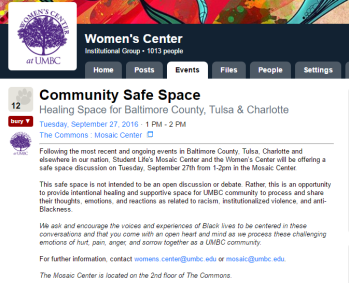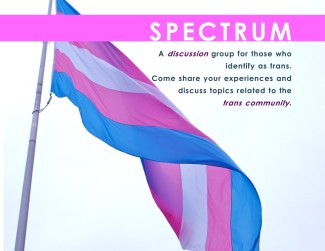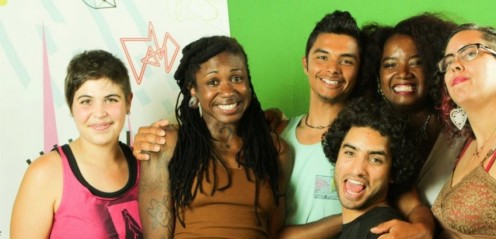 A reflection by Women’s Center staff member Daniel
A reflection by Women’s Center staff member Daniel
Trigger warning for suicide mention; resources at the bottom of the post
My community experienced a tragedy early this October, and the ripples from the impact are still cascading across campus and beyond. I woke up that morning to several messages from friends and coworkers telling me what I already knew: a dear friend had passed from suicide.
This friend was a very private person whose spouse has also asked for privacy. In order to respect their wishes, this blog post isn’t about her. That said, I’m incredibly sad about her passing and I miss her every day and I certainly don’t want anybody to forget her. Ever. She was insatiably curious and incredibly smart. She cared deeply for her community and the students she encountered. And now she’s gone.
My friend was a trans woman and she was active in the community of queer and trans students on campus. Her death had an enormous impact on that community, and we continue to be impacted by it for many reasons. Many, and in fact most, of us in the queer and trans community live with mental illness, neurodiversity, or both, and to see it overtake someone who tried so hard for so long is discouraging at best. Mostly, it’s frightening. According to the National Transgender Discrimination Survey Report on health and health care, 41% of trans people attempt suicide in their lifetime. In the face of all of this, it’s been so hard for my community to see the light.
But also in the face of all of this, I’ve seen some incredible coming together. We are a community who has had to learn how to take care of each other. It can be difficult because sometimes we can’t even take care of ourselves, but when shit really hits the fan I know I have people I can be with. There are people with whom I can cry and talk frankly about how fucking bad it feels. And then we hold each other and support one another and even though we’re all having a hard time, we’re doing it together.
Last week during Critical Social Justice week, Leah Lakshmi Piepzna-Samarasinha had lunch and a small seminar with the Women’s Center and Mosaic Center staff, and she said some things I’m still thinking about. She talked about the ways in which queer, racialized, and disabled folks work together to navigate and circumvent systems which oppress us and were never built to support us in the first place.

Leah speaking at the CSJ Home keynote event
In her keynote lecture, she talked about how she and her other disabled friends can construct a ramp out of practically anything when they need to make a space accessible to those with limited mobility. Trans people who want hormones (but can’t get them because of the many many barriers to trans-centered healthcare) buy or get them from those who can. It is not safe to take any sort of medication without the supervision of a licensed physician, but half the time trans people are the ones telling their doctors how hormones and dosages work in the first place. Sylvia Rivera and Marsha P Johnson headed STAR House in New York City in the 1970s as a way to shelter and feed homeless drag queens and runaways. The Black Panthers began a movement and social programs for black americans and black youth in response to police brutality, structural racism, and white-perpetrated violence. Marginalized people have been carving out spaces and networks for themselves since forever. Their communities had a need and the structures in place weren’t helping– in fact, those structures were (and still are) half the problem. So they did something about it.
One alternative space I want to highlight in this difficult time is Healing Justice. Healing Justice is both a space and a framework. Both began as a formal movement around 2010 during that year’s Allied Media Conference. Queer, disabled activists of color met and developed a set of principles and values. Some of those activists were Badass Visionary Healers Mkali-HashikiI, Mareclo Garzo, Rico, Tieraney Carter, Leah Lakshmi Piepzna-Samarasinha, and Jonah Aline Daniel, as well as shay(den) n. gonzalez, Hong Gwi-Seok of Iyengar Yoga Detroit, Nina Metsovaara, Robbins, Autumn Brown of Rock Dove Collective, and Rico Kleinstein Chenyek*. They created a space in which social justice activists and healers can come together to practice care.
The Healing Justice Practice Space asserts that “The way we care for ourselves and each other directly relates to our resilience and that of our communities, collectives, and movements.” We can’t continue to do the work, or sometimes even simply continue to exist, if we are not caring for ourselves and one another. We place so much value on hard work and sleepless nights that we wear ourselves out and cause our movements fizzle away. It also makes our movements and work inaccessible to people who cannot operate their lives in this way. Healing Justice asks us to integrate care into our activism and everyday lives. It asks us to set aside space and time to care and be cared for.
Healing Justice can be a way to circumvent traditional health and mental health care practices and institutions for those who cannot or do not wish to access it. Healing Justice Practice Spaces might provide services such as acupuncture, crystal healing, herbal medicine, massage therapy, “energy and bodywork, tarot & divination, visual, auditory, and movement arts, meditation as well as skillshares such as community medics workshops, trans*body workshares, body support for grief, and inducing menstruation strategy shares.” Some collectives and groups which operate within a healing justice framework toe the line of legality by providing medications and other services typically reserved for licensed physicians. Many of the practitioners in these collectives are licensed and have a vast knowledge of their field, but choose to practice in this way because they are better able to serve a community of people in need.
While some might consider these practices to be dubious at best, I challenge you to think about why a person might seek care in this way, what barriers one might face to accessing western medicine, and why we devalue medicinal practices not based in western medicine. What “legitimate” systems can’t (or won’t) provide, “illegitimate” systems often do.

The Women’s Center often holds space for communities to gather and heal after difficult events
One of my favorite aspects of Healing Justice is the idea of interdependence. Interdependence is understanding that “the ways we live with and treat each other has a direct impact on our wellness and collective well being towards liberation, healing and transforming our conditions.” Interdependence rejects individualist approaches to self care and acknowledges the ways in which we are all connected to one another, the environment, and the harmony of the natural world. Interdependence requires us to think about the ways in which we impact one another and allows us to rely on others.
Healing Justice is what my community needs now. It needs healing space which acknowledges trauma, practices harm reduction, allows us to trust our bodies and ourselves, and allows us to depend on one another. This isn’t to say it will be easy. Not everyone has the same needs and some of these needs will be in conflict. But, doing the work of building a structure which can support us is essential to our survival.
If you feel like you’re missing this community, it’s okay to ask for help.

Women’s Center Spectrum program
There are many places online to find your community, but there are also some spaces on campus. The Women’s Center hosts Spectrum, a discussion-based program for trans, gender non-conforming and questioning students, every other Thursday at 11am. The Counseling Center offers a support group for trans students Fridays at 2pm; you can email Dr. Stuber-Lawson at estuber@umbc.edu to join. The QSL (Queer Student Lounge) is a space in the UC (on the second floor; follow the flags all the way down the hall) where students can hang out and where Freedom Alliance and QUMBC (student orgs for LGBTQ students) meet.
If you feel like you DO have this community, think about how you can open it up to other people who share your struggle.Think about how you can help make your space inclusive, accessible and inviting to those who need it.
For anyone interested in collective organizing which is accessible to all bodies and conditions, and accounts for healing and interdependence, check out the resources below.
If you or someone you know is struggling and needs help, please contact the UMBC Counseling Center (410-455-2472), Campus Police (410-455-5555), or this toll-free suicide hotline (1-800-273-8255).
You can also text this crisis line (Text START to 741-741) or contact the Trevor Project via text, chat, or phone.
The Trevor Project and It Gets Better are both crisis support and suicide prevention resources aimed at LGBTQ people. Trans Lifeline is a crisis hotline run by trans people for trans people.
A crisis can look like a lot of things– questioning identity, experiencing hate or discrimination, difficult situations at home, etc. A crisis is never not serious enough to contact these resources.
More About Healing Justice and Resources:
- Healing Justice Practice Space
- Badass Visionary Healers
- Health And Healing Justice and Liberation Values
- Health and Healing Justice and Liberation Organizing Principles
- How To Build A Healing Justice Practice Space
- Models of Consensus
- Consensus Process Flow Chart
- Tips on how to make a space/event accessible
- Tips for maintaining safety during an event/organizing meeting
*Badass Visionary Healers makes a point to acknowledge their lineage: who came before them and who inspired their work. I am following their lead and acknowledging the wisdom and hard work of the activists who often go unmentioned.
